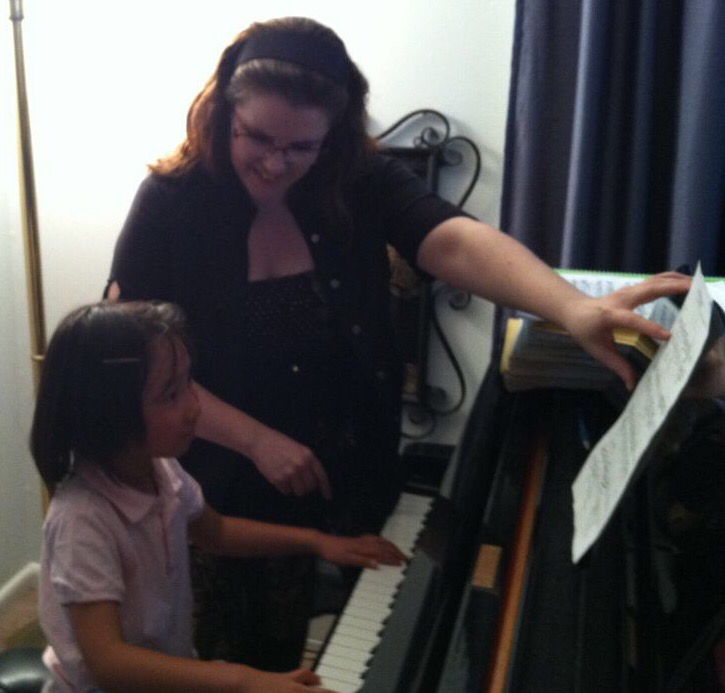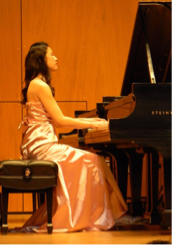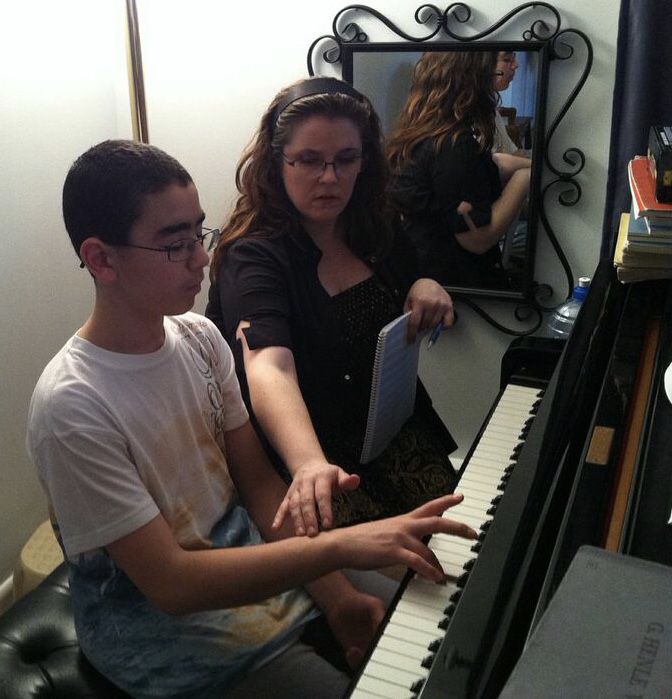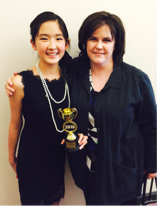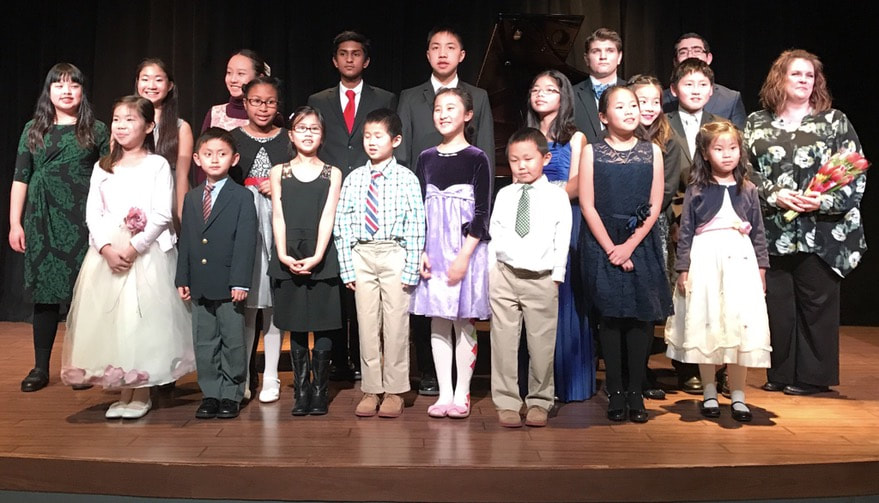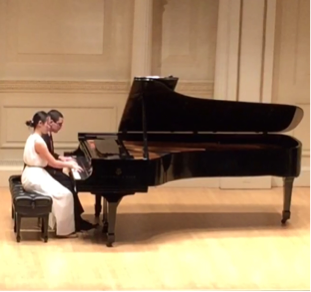LEARN CORRECTLY FROM THE BEGINNING
|
From the very first lesson, students need to develop correct habits in terms of reading, technique, and listening skills. It is during the beginning stages that habits are formed, so when students are not taught correctly, it is extremely difficult for them to uno what has been engrained and relearn the correct ways to play and read music. It can be quite challenging (a very difficult and frustrating process). When the only habits that are formed are the correct ones, the learning process is enjoyable and inspiring.
I was fortunate enough to learn how to teach young children from Mr. Solomon Mikowsky at the Manhattan School of Music. After teaching me piano pedagogy, I closely observed his lesson with young children at the MSM Precollege Division. Before that I was also fortunate to learn piano pedagogy from Eleanor Nelson of The Juilliard School. |
TEACHING THE TOOLS OF EXPRESSION THROUGH THE PIANO
|
I love teaching the highest level students such as those I taught at the High School Attached to the Central Conservatory of Music in Beijing, China (中央音乐学院附中) as well as beginner students as young as four years old! I am passionate about working with young children and understand the importance of teaching them correctly from the beginning while inspiring them to love music! I welcome the opportunity to work with students from beginner children, intermediate students, and adult professionals. |
MY UNUSUAL MUSICAL BACKGROUND INFLUENCES MY TEACHNG
|
My musical background is different than most professional pianists and I feel that this actually enhances my teaching. My technical training came later than most, making me much more aware of how to solve technical issues. I have also been very fortunate to learn many different types and styles of techniques since my teachers and great musical influences came from different pianistic traditions from all over the world - Canada, China, Cuba, Europe, Japan, Russia, and the U. S.
In the beginning I was taught by a most inspirational teacher who taught me musicianship and interpretation through deep theoretical understanding with a “safety first” style of technique. Theory is what helps us “read between the notes” and make music, not simply read notes and push keys. All of my teachers showed me how to create a range of sounds and colors on the piano by teaching me all aspects of how the instruments works and how to use it to its full advantage. Most importantly, they taught me how to channel my emotions and imagination to create beautiful music. My goal is to share this with every student. |
DEDICATION TO STUDENTS AND TEACHING
|
When I take on a student, I am completely dedicated to giving each student the best musical education I know how. This is what my teachers did and I love having the opportunity to “give back”! To me, teaching is not simply teaching one or two lessons a week, it is important to keep in contact between lessons. If students have questions it is best that they ask sooner rather than wait many days without practicing or practicing wrong habits. Students can send me pictures of their music and circle the spot with the question and even send me little video clips! |
CURRICULUM
Students take lessons once or twice every week, performance classes are held once every month,
and concerts occur two times every year.
and concerts occur two times every year.
|
INDIVIDUAL LESSONS
All students will take individual piano lessons once or twice every week. The length and frequency of these lessons will vary according to each student’s age and level and will be discussed with each student and parent at the beginning of their studies with me and again at certain points throughout their studies as the student develops. The amount of time students need to practice every day will also vary depending on their level and will be discussed during lessons. The length and frequency of lessons do not necessarily reflect the amount of time needed to practice every day. Students will study a combination of different musical aspects including technique, musicianship, theory, history, and performance in order to develop as a well-rounded musician. |
PERFORMANCE CLASSES (held on Sundays at 4pm approximately once a month)
When music is shared with peers, it is so much fun, development is much quicker in so many areas of music making, and students feel much more satisfied when they sit down to practice and play.
Performance Classes are held approximately once every month. All students attend every Performance Class, whether or not they will perform, as it is one of the most valuable tools in music education. In Performance Classes, students not only get the opportunity to practice performing and to bring their pieces to another level, but also to develop their listening skills.
Performing takes practice, just as learning notes, training muscles, shaping a piece, etc. The more experience we have performing, the more successful we become at expressing ourselves in public. Also, with each performance of a piece comes a new understanding of the piece and shortcomings that were not evident in the studio come clear. It is also a great tool for students who could use an extra push to reach their goals.
Performance Classes are not only learning experiences for those who perform, but also for students listening in the audience. After each performance, students give helpful comments to each performer. Productive, constructive criticism includes aspects of the performance that they enjoyed, things that they feel could have been better or different, and suggestions on how to make those changes. Remarks on stage manner, musicianship, technique, pedaling, etc. are all welcome. The atmosphere of Performance Classes is always supportive, so be encouraging to your studio-mates. The word “should” implies that there is only one way to do something, and in art that does not exist! There is also no "wrong" in art. Instead say, “try…”, “I would…”, or "have you considered..."
Since this is a class about performance, students who will be performing need to dress as they would for a concert, recital, audition, or competition. Concert dress varies due to performance situations so dress for Performance Class as you would for an afternoon concert:
Ladies: Dress or skirt (below the knee or longer) or dress pants with a dressy top and dress shoes.
Gentlemen: Dress shirt, tie, dress pants, black socks, dress shoes. (Jacket optional)
(Ladies & Gentleman: Absolutely no sneakers, boots, sweatshirts, sweatpants, denim, t-shirts permitted)
For those of you who have upcoming performances, auditions, or competitions, Performance Class is the place to practice performing in the same apparel that you will wear at your performance. It is extremely important to get used to performing in that clothing. You do not want a wardrobe malfunction to happen while on stage in the actual performance! For ladies, this may include a concert dress/ball gown and heels, and for gentlemen, a jacket or tuxedo and dress shoes. The most important clothing to always practice performing in are shoes, dresses or tops with straps, and jackets.
CONCERTS (held twice a year on Sundays at 5pm)
Student concerts are held twice every year, once in the winter and again the at the end of the school year. Through performing in formal concerts, students have a wonderful occasion to express themselves through their art. All students are encouraged to practice very diligently in order to obtain the privilege of performing in concerts. Students must dress in performance attire in order to perform.
COMPETITIONS & AUDITIONS
Some students enjoy participating in auditions & competitions and they can be quite motivating. Some of these auditions are simply to get valuable feedback from other pianists/piano teachers/judges while some competitions give feedback as well as such prizes as performing at venues such as Carnegie Hall, winning scholarships, and/or cash prizes. There are many different levels and types of auditions and competitions available so if you are interested, please let me know. I will also let you know if I feel any will be of particular value to you.
CHAMBER MUSIC
When music is shared with peers, it is fun and both musical and personal development is much quicker in so many areas. So I always encourage students to play chamber music - to play together with their friends, studiomates, or classmates) as duos, trios, quartets, etc.
When music is shared with peers, it is so much fun, development is much quicker in so many areas of music making, and students feel much more satisfied when they sit down to practice and play.
Performance Classes are held approximately once every month. All students attend every Performance Class, whether or not they will perform, as it is one of the most valuable tools in music education. In Performance Classes, students not only get the opportunity to practice performing and to bring their pieces to another level, but also to develop their listening skills.
Performing takes practice, just as learning notes, training muscles, shaping a piece, etc. The more experience we have performing, the more successful we become at expressing ourselves in public. Also, with each performance of a piece comes a new understanding of the piece and shortcomings that were not evident in the studio come clear. It is also a great tool for students who could use an extra push to reach their goals.
Performance Classes are not only learning experiences for those who perform, but also for students listening in the audience. After each performance, students give helpful comments to each performer. Productive, constructive criticism includes aspects of the performance that they enjoyed, things that they feel could have been better or different, and suggestions on how to make those changes. Remarks on stage manner, musicianship, technique, pedaling, etc. are all welcome. The atmosphere of Performance Classes is always supportive, so be encouraging to your studio-mates. The word “should” implies that there is only one way to do something, and in art that does not exist! There is also no "wrong" in art. Instead say, “try…”, “I would…”, or "have you considered..."
Since this is a class about performance, students who will be performing need to dress as they would for a concert, recital, audition, or competition. Concert dress varies due to performance situations so dress for Performance Class as you would for an afternoon concert:
Ladies: Dress or skirt (below the knee or longer) or dress pants with a dressy top and dress shoes.
Gentlemen: Dress shirt, tie, dress pants, black socks, dress shoes. (Jacket optional)
(Ladies & Gentleman: Absolutely no sneakers, boots, sweatshirts, sweatpants, denim, t-shirts permitted)
For those of you who have upcoming performances, auditions, or competitions, Performance Class is the place to practice performing in the same apparel that you will wear at your performance. It is extremely important to get used to performing in that clothing. You do not want a wardrobe malfunction to happen while on stage in the actual performance! For ladies, this may include a concert dress/ball gown and heels, and for gentlemen, a jacket or tuxedo and dress shoes. The most important clothing to always practice performing in are shoes, dresses or tops with straps, and jackets.
CONCERTS (held twice a year on Sundays at 5pm)
Student concerts are held twice every year, once in the winter and again the at the end of the school year. Through performing in formal concerts, students have a wonderful occasion to express themselves through their art. All students are encouraged to practice very diligently in order to obtain the privilege of performing in concerts. Students must dress in performance attire in order to perform.
COMPETITIONS & AUDITIONS
Some students enjoy participating in auditions & competitions and they can be quite motivating. Some of these auditions are simply to get valuable feedback from other pianists/piano teachers/judges while some competitions give feedback as well as such prizes as performing at venues such as Carnegie Hall, winning scholarships, and/or cash prizes. There are many different levels and types of auditions and competitions available so if you are interested, please let me know. I will also let you know if I feel any will be of particular value to you.
CHAMBER MUSIC
When music is shared with peers, it is fun and both musical and personal development is much quicker in so many areas. So I always encourage students to play chamber music - to play together with their friends, studiomates, or classmates) as duos, trios, quartets, etc.
